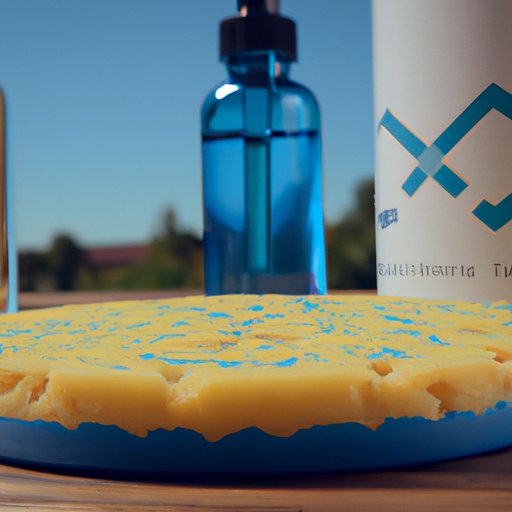Introduction
Hyaluronic acid is a naturally occurring substance found in the human body. It plays an important role in skin health and is often used in skincare products to hydrate and protect the skin. But is there a connection between hyaluronic acid and acne? In this article, we explore the potential link between these two substances and examine the evidence for a connection.
An In-Depth Look at How Hyaluronic Acid Can Affect Acne Prone Skin
In order to understand the potential connection between hyaluronic acid and acne, it’s important to first look at how hyaluronic acid works in the body. This substance is naturally produced by the body and is responsible for providing moisture and elasticity to the skin. It helps to keep the skin hydrated and plump, which can help to reduce the appearance of wrinkles and fine lines.
When it comes to acne prone skin, hyaluronic acid can help to reduce inflammation and redness. It can also help to balance oil production, which can help to prevent breakouts. However, some people may be more sensitive to hyaluronic acid than others, and in these cases, it can actually make acne worse.

Exploring the Potential Link Between Hyaluronic Acid and Acne
There is some debate over whether or not hyaluronic acid can cause acne. Some studies have suggested that it can, while others have found no link between the two substances. To better understand the potential connection between hyaluronic acid and acne, it’s important to look at the evidence for a link.
Examining the Evidence for a Connection
One study examined the effects of hyaluronic acid on acne prone skin and found that it had a positive effect. The study found that when applied topically, hyaluronic acid was able to reduce inflammation and redness associated with acne. It also helped to improve skin hydration and elasticity, which can help to reduce the appearance of wrinkles and fine lines.
Other studies have looked at the impact of hyaluronic acid on acne lesions. These studies have found that hyaluronic acid can help to reduce the size of acne lesions and reduce the severity of breakouts. However, the results of these studies are inconclusive and more research is needed to determine if hyaluronic acid can truly help to reduce the severity of acne breakouts.

Investigating Possible Causes of this Link
While some studies have found a positive connection between hyaluronic acid and acne, it’s important to consider other factors that could be influencing the results. One factor to consider is the type of product being used. Many hyaluronic acid products contain other ingredients that can irritate the skin and potentially trigger an acne breakout. It’s important to check the ingredients list of any product before using it to make sure it doesn’t contain any ingredients that could worsen your acne.
It’s also important to consider the individual’s skin type. Those with oily or combination skin may find that hyaluronic acid can make their acne worse, while those with dry skin may find that it helps to reduce breakouts. It’s important to experiment with different products and find one that works best for your skin type.
Is Hyaluronic Acid a Potential Cause of Acne?
At this time, there is not enough evidence to definitively say that hyaluronic acid causes acne. While some studies have found a link between the two, the results are inconclusive. It’s important to consider other possible causes of acne breakouts, such as hormones, diet, and lifestyle habits, before blaming hyaluronic acid.
Understanding the Role of Hyaluronic Acid in Acne Breakouts
Although hyaluronic acid may not be the cause of acne breakouts, it can still play an important role in treating them. Hyaluronic acid can help to reduce inflammation and redness associated with breakouts, as well as improving skin hydration and elasticity. This can help to reduce the appearance of acne scars and improve overall skin health.
It’s also important to note that hyaluronic acid can be used in combination with other treatments, such as topical creams and antibiotics, to help reduce the severity of breakouts. This can help to speed up the healing process and reduce the risk of scarring.

Investigating the Connection Between Hyaluronic Acid and Acne
Overall, there is not enough evidence to definitively say that hyaluronic acid causes acne. However, it can still play an important role in treating and preventing breakouts. It’s important to consider other possible causes of acne breakouts and to experiment with different products to find one that works best for your skin type.
It’s also important to be aware of any potential side effects of using hyaluronic acid, such as irritation or dryness. If you experience any of these symptoms, it’s important to stop using the product immediately and consult a doctor if necessary.
Conclusion
In conclusion, although there is not enough evidence to definitively say that hyaluronic acid causes acne, it can still play an important role in treating and preventing breakouts. It’s important to consider other possible causes of acne breakouts, experiment with different products, and be aware of any potential side effects of using hyaluronic acid.


